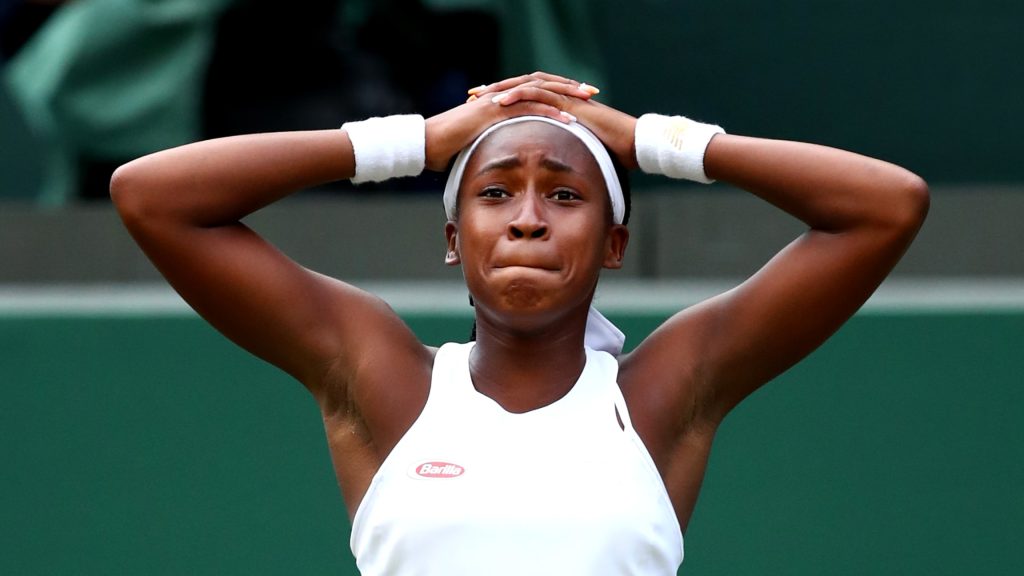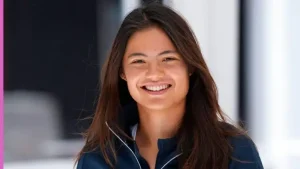
In one whirlwind week, she made the sport feel young again.
This year, for Black History Month, we’re focusing on a young African-American who has already made her share of tennis history. In her six years as a pro, Coco Gauff has grabbed the Grand Slam-winning baton from Venus and Serena Williams, while also continuing Arthur Ashe’s commitment to racial justice.
With Gauff’s 20th birthday coming up in March, we’re spending this week looking at five milestone moments from her teens.
2019: Beats one of her idols, Venus Williams, and reaches the fourth round at Wimbledon at 15
Even before she played her first main-draw match at the All England Club in 2019, we knew Gauff had a precocious game. After all, she had just become the youngest person ever—at 15—to qualify for Wimbledon. What we learned during her fourth-round run was that she also possessed a precocious star power, and a personality that blended youthful exuberance with a serious sense of purpose.
“My motto is, ‘Just wing it,’” Gauff said, in one of her many memorable quotes from that week. “We’re all going to die one day, I just want to make the most of it.”
In her debut, she played one of her idols, and a woman 24 years her senior, Venus Williams. The match was held on No. 1 Court, the second-biggest arena on the grounds. Far from collapsing with stage fright, Gauff beat the five-time Wimbledon champion in straight sets and drove the capacity crowd—which filled the stadium and nearby Henman Hill—to near-delirium in the process. Faced with serving out the match at 5-4 in the second set, she found some of her best tennis—including a stunner of a 112-m.p.h second serve—when she needed it.
But she wasn’t finished with her charm offensive. At the net, Gauff showed just the right, respectful touch by leaning over to her legendary opponent and saying, “Thank you for what you did, I wouldn’t be here if it wasn’t for you.”
After grabbing the torch from Venus, and defeating Magdalena Rybarikova in straight sets, Gauff moved into Centre Court, where she thrilled another packed house by making a seemingly impossible comeback against Polona Hercog from a set and 2-5 down. It took the eventual champion, Simona Halep, to end the teen’s storybook run in the fourth round. But from first ball to last, Gauff showed a grown-up ability to choose the right shot at the right time, to balance aggression with margin, and caution with creativity. She played to win rather to impress.
“I think I can beat anyone who’s across the court,” Gauff said that week, in one of the rare comments when she didn’t crack a smile. “If I don’t think I can win a match, I don’t step on the court.”
Coco Gauff was serious about her aims, but her wins brought a joyful sense of déjà vu to Wimbledon. Thousands of fans there were cheering on a new player, but also an old feeling: The sense of discovery, of gravity-defying innocence that only a prodigy can bring to sports. From Chris Evert to Rafael Nadal, tennis had once been the province of the prodigy, but Gauff appeared at a time when the game was graying, and its stars were well into their 30s. In one whirlwind week, she made the sport feel young again.
Asked to explain her new superhero status, Gauff shrugged, smiled her trademark quick-bursting smile and said, “I just went for my shots.”
It was nice for tennis fans to be able to believe, at least for a week, that it could still be that easy, and that teen dreams could still come true.







